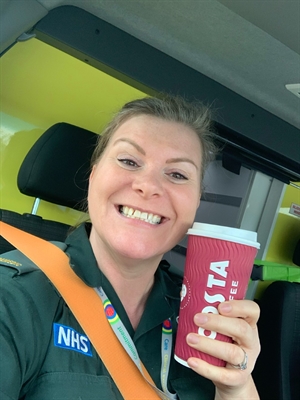 What year did you graduate?
What year did you graduate?
2015 FdSc and 2019 BSc
What course did you study?
Paramedic Science
What is your current role?
Paramedic and Mentor
How did you get into your current role?
Towards the end of my FdSc course we interviewed for London Ambulance Service and I was offered a conditional position as a Paramedic
Can you describe a typical day?
My typical day starts early and after ensuring the kit is complete on the Ambulance or car, I sign out my drug bags and morphine, book on and go to my first job. The job could be anything from helping an elderly person off the floor to cardiac arrest. If I am not the driver for the morning I would be attending and so responsible for getting a full history surrounding the patient, treating them, making all decisions, completing paperwork and conveying to hospital if appropriate. Twelve hours later my day would finish.
What do you enjoy about your role?
I love being a Paramedic because you never know when, what or who you will be called to next. Even the most usual jobs can often become emergencies. I realised very quickly that an emergency to one person might not be an emergency to all, so it’s important to be empathetic and non-judgmental. Helping people reason through problems and counselling them as much as possible in the short time we have with them, gives me a feeling of satisfaction when I believe I have helped in anyway.
What do you find challenging in your current role?
Sometimes it’s difficult to go from doing nothing to a high-pressured job in the middle of the night, but that is the nature of the job. But overall I think the most challenging thing about the job is the limitation in some patient treatments which we have. For example, needing a bed for a mental health patient and not being able to find one.
What advice would you give to a current student at St George’s who is keen to get into a similar area of work as you?
My advice would be to create your own glossary of terms and heart conditions in your own words to refer to, as I found this extremely useful when I first came to the job and it enabled me to collate information I saw on placement along with my reflections. But otherwise, get a good support network around you, never be afraid to ask a question and always be open to learning.
Which aspects of your degree are relevant for your current role?
Every aspect of both the FdSc and my BSc modules we’re relevant because St Georges courses are not combined and many specialists and lecturers taught me with great enthusiasm and knowledge. I still now refer back to my university work when making decisions.
Do you have any advice or a message for current students at St George’s?
We are living in changing times and now more than ever is the best time to become a Paramedic. We are regarded as specialists in our field more than we ever have been and the opportunities a Paramedic has to choose from in their career is endless.
Do you have any advice or a message for students considering studying at St George’s?
I am proud to have studied with the professional lecturers at St Georges and would advise you to talk to alumni, find a network and choose the course which you feel passionate about. The passion and support will give you the confidence to thrive and be as proud as me to have put all the effort into your studies. Good luck to you all.